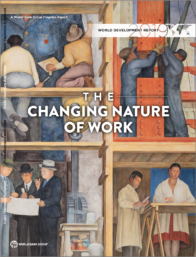
THE CHANGING NATURE OF WORK

The World Development Report (WDR) 2019: The Changing Nature of Work studies how the nature of work is changing as a result of advances in technology today. Fears that robots will take away jobs from people have dominated the discussion over the future of work, but the World Development Report 2019 finds that on balance this appears to be unfounded. Work is constantly reshaped by technological progress. Firms adopt new ways of production, markets expand, and societies evolve. Overall, technology brings opportunity, paving the way to create new jobs, increase productivity, and deliver effective public services. Firms can grow rapidly thanks to digital transformation, expanding their boundaries and reshaping traditional production patterns. The rise of the digital platform firm means that technological effects reach more people faster than ever before. Technology is changing the skills that employers seek. Workers need to be better at complex problem-solving, teamwork and adaptability. Digital technology is also changing how people work and the terms on which they work. Even in advanced economies, short-term work, often found through online platforms, is posing similar challenges to those faced by the world’s informal workers. The Report analyzes these changes and considers how governments can best respond. Investing in human capital must be a priority for governments in order for workers to build the skills in demand in the labor market. In addition, governments need to enhance social protection and extend it to all people in society, irrespective of the terms on which they work. To fund these investments in human capital and social protection, the Report offers some suggestions as to how governments can mobilize additional revenues by increasing the tax base.
- Issue:
- Technology
- Region:
- Global
- Year Published:
- 2019
- Institution:
- World Bank Group
- Tags:
- society, robots, firms, production, markets, human capital

